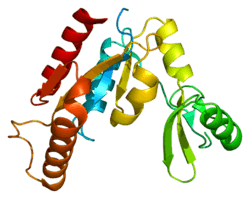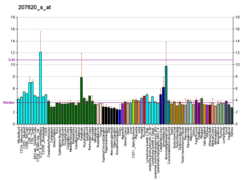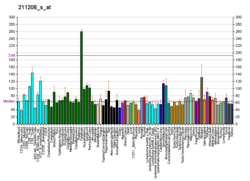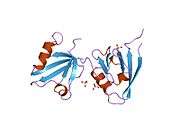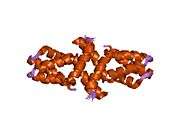CASK
Peripheral plasma membrane protein CASK is a protein that in humans is encoded by the CASK gene.[3][4] This gene is also known by several other names: CMG 2 (CAMGUK protein 2), calcium/calmodulin-dependent serine protein kinase 3 and membrane-associated guanylate kinase 2.
Gene
This gene is located on the short arm of the X chromosome (Xp11.4). It is 404,253 bases in length and lies on the Crick (minus) strand. The encoded protein has 926 amino acids with a predicted molecular weight of 105,123 Daltons.
Function
This protein is a multidomain scaffolding protein with a role in synaptic transmembrane protein anchoring and ion channel trafficking. It interacts with the transcription factor TBR1 and binds to several cell-surface proteins including amyloid precursor protein, neurexins and syndecans.
Clinical importance
This gene has been implicated in X-linked mental retardation,[5] including specifically mental retardation and microcephaly with pontine and cerebellar hypoplasia.[6]
Interactions
CASK has been shown to interact with:
- KCNJ4[7][8]
- APBA1[9][10]
- ATP2B4[11]
- CINAP and TBR1[12]
- DLG1[8][13][14]
- DLG4[13]
- F11 receptor[15][16]
- ID1[17]
- KCNJ12[7][8]
- LIN7A[8][9]
- Nephrin[18]
- Parkin (ligase)[19]
- RPH3A[20]
- SDC2[20][21]
References
- ↑ "Human PubMed Reference:".
- ↑ "Mouse PubMed Reference:".
- ↑ Dimitratos SD, Stathakis DG, Nelson CA, Woods DF, Bryant PJ (Nov 1998). "The location of human CASK at Xp11.4 identifies this gene as a candidate for X-linked optic atrophy". Genomics. 51 (2): 308–309. PMID 9722958. doi:10.1006/geno.1998.5404.
- ↑ "Entrez Gene: CASK Calcium/calmodulin-dependent serine protein kinase (MAGUK family)".
- ↑ Tarpey PS, Smith R, Pleasance E, Whibley A, Edkins S, Hardy C, O'Meara S, Latimer C, Dicks E, Menzies A, Stephens P, Blow M, Greenman C, Xue Y, Tyler-Smith C, Thompson D, Gray K, Andrews J, Barthorpe S, Buck G, Cole J, Dunmore R, Jones D, Maddison M, Mironenko T, Turner R, Turrell K, Varian J, West S, Widaa S, Wray P, Teague J, Butler A, Jenkinson A, Jia M, Richardson D, Shepherd R, Wooster R, Tejada MI, Martinez F, Carvill G, Goliath R, de Brouwer AP, van Bokhoven H, Van Esch H, Chelly J, Raynaud M, Ropers HH, Abidi FE, Srivastava AK, Cox J, Luo Y, Mallya U, Moon J, Parnau J, Mohammed S, Tolmie JL, Shoubridge C, Corbett M, Gardner A, Haan E, Rujirabanjerd S, Shaw M, Vandeleur L, Fullston T, Easton DF, Boyle J, Partington M, Hackett A, Field M, Skinner C, Stevenson RE, Bobrow M, Turner G, Schwartz CE, Gecz J, Raymond FL, Futreal PA, Stratton MR (May 2009). "A systematic, large-scale resequencing screen of X-chromosome coding exons in mental retardation". Nat. Genet. 41 (5): 535–43. PMC 2872007
 . PMID 19377476. doi:10.1038/ng.367.
. PMID 19377476. doi:10.1038/ng.367. - ↑ Burglen L, Chantot-Bastaraud S, Garel C, Milh M, Touraine R, Zanni G, Petit F, Afenjar A, Goizet C, Barresi S, Coussement A, Ioos C, Lazaro L, Joriot S, Desguerre I, Lacombe D, des Portes V, Bertini E, Siffroi JP, de Villemeur TB, Rodriguez D (2012). "Spectrum of pontocerebellar hypoplasia in 13 girls and boys with CASK mutations: confirmation of a recognizable phenotype and first description of a male mosaic patient". Orphanet Journal of Rare Diseases. 7 (18): 18. PMC 3351739
 . PMID 22452838. doi:10.1186/1750-1172-7-18.
. PMID 22452838. doi:10.1186/1750-1172-7-18. - 1 2 Leonoudakis D, Conti LR, Anderson S, Radeke CM, McGuire LM, Adams ME, Froehner SC, Yates JR, Vandenberg CA (May 2004). "Protein trafficking and anchoring complexes revealed by proteomic analysis of inward rectifier potassium channel (Kir2.x)-associated proteins". J. Biol. Chem. 279 (21): 22331–46. PMID 15024025. doi:10.1074/jbc.M400285200.
- 1 2 3 4 Leonoudakis D, Conti LR, Radeke CM, McGuire LM, Vandenberg CA (April 2004). "A multiprotein trafficking complex composed of SAP97, CASK, Veli, and Mint1 is associated with inward rectifier Kir2 potassium channels". J. Biol. Chem. 279 (18): 19051–63. PMID 14960569. doi:10.1074/jbc.M400284200.
- 1 2 Borg JP, Straight SW, Kaech SM, de Taddéo-Borg M, Kroon DE, Karnak D, Turner RS, Kim SK, Margolis B (November 1998). "Identification of an evolutionarily conserved heterotrimeric protein complex involved in protein targeting". J. Biol. Chem. 273 (48): 31633–6. PMID 9822620. doi:10.1074/jbc.273.48.31633.
- ↑ Borg JP, Lõpez-Figueroa MO, de Taddèo-Borg M, Kroon DE, Turner RS, Watson SJ, Margolis B (February 1999). "Molecular analysis of the X11-mLin-2/CASK complex in brain". J. Neurosci. 19 (4): 1307–16. PMID 9952408.
- ↑ Schuh K, Uldrijan S, Gambaryan S, Roethlein N, Neyses L (March 2003). "Interaction of the plasma membrane Ca2+ pump 4b/CI with the Ca2+/calmodulin-dependent membrane-associated kinase CASK". J. Biol. Chem. 278 (11): 9778–83. PMID 12511555. doi:10.1074/jbc.M212507200.
- ↑ Wang GS, Hong CJ, Yen TY, Huang HY, Ou Y, Huang TN, Jung WG, Kuo TY, Sheng M, Wang TF, Hsueh YP (April 2004). "Transcriptional modification by a CASK-interacting nucleosome assembly protein". Neuron. 42 (1): 113–28. PMID 15066269. doi:10.1016/S0896-6273(04)00139-4.
- 1 2 Chetkovich DM, Bunn RC, Kuo SH, Kawasaki Y, Kohwi M, Bredt DS (August 2002). "Postsynaptic targeting of alternative postsynaptic density-95 isoforms by distinct mechanisms". J. Neurosci. 22 (15): 6415–25. PMID 12151521.
- ↑ Nix SL, Chishti AH, Anderson JM, Walther Z (December 2000). "hCASK and hDlg associate in epithelia, and their src homology 3 and guanylate kinase domains participate in both intramolecular and intermolecular interactions". J. Biol. Chem. 275 (52): 41192–200. PMID 10993877. doi:10.1074/jbc.M002078200.
- ↑ Martinez-Estrada OM, Villa A, Breviario F, Orsenigo F, Dejana E, Bazzoni G (March 2001). "Association of junctional adhesion molecule with calcium/calmodulin-dependent serine protein kinase (CASK/LIN-2) in human epithelial caco-2 cells". J. Biol. Chem. 276 (12): 9291–6. PMID 11120739. doi:10.1074/jbc.M006991200.
- ↑ Ebnet K, Schulz CU, Meyer Zu Brickwedde MK, Pendl GG, Vestweber D (September 2000). "Junctional adhesion molecule interacts with the PDZ domain-containing proteins AF-6 and ZO-1". J. Biol. Chem. 275 (36): 27979–88. PMID 10856295. doi:10.1074/jbc.M002363200.
- ↑ Qi J, Su Y, Sun R, Zhang F, Luo X, Yang Z, Luo X (March 2005). "CASK inhibits ECV304 cell growth and interacts with Id1". Biochem. Biophys. Res. Commun. 328 (2): 517–21. PMID 15694377. doi:10.1016/j.bbrc.2005.01.014.
- ↑ Lehtonen S, Lehtonen E, Kudlicka K, Holthöfer H, Farquhar MG (September 2004). "Nephrin forms a complex with adherens junction proteins and CASK in podocytes and in Madin-Darby canine kidney cells expressing nephrin". Am. J. Pathol. 165 (3): 923–36. PMC 1618613
 . PMID 15331416. doi:10.1016/S0002-9440(10)63354-8.
. PMID 15331416. doi:10.1016/S0002-9440(10)63354-8. - ↑ Fallon L, Moreau F, Croft BG, Labib N, Gu WJ, Fon EA (January 2002). "Parkin and CASK/LIN-2 associate via a PDZ-mediated interaction and are co-localized in lipid rafts and postsynaptic densities in brain". J. Biol. Chem. 277 (1): 486–91. PMID 11679592. doi:10.1074/jbc.M109806200.
- 1 2 Zhang Y, Luan Z, Liu A, Hu G (May 2001). "The scaffolding protein CASK mediates the interaction between rabphilin3a and beta-neurexins". FEBS Lett. 497 (2-3): 99–102. PMID 11377421. doi:10.1016/S0014-5793(01)02450-4.
- ↑ Cohen AR, Woods DF, Marfatia SM, Walther Z, Chishti AH, Anderson JM, Wood DF (July 1998). "Human CASK/LIN-2 binds syndecan-2 and protein 4.1 and localizes to the basolateral membrane of epithelial cells". J. Cell Biol. 142 (1): 129–38. PMC 2133028
 . PMID 9660868. doi:10.1083/jcb.142.1.129.
. PMID 9660868. doi:10.1083/jcb.142.1.129.
Further reading
- Zhu ZQ, Wang D, Xiang D, Yuan YX, Wang Y (2014). "Calcium/calmodulin-dependent serine protein kinase is involved in exendin-4-induced insulin secretion in INS-1 cells". Metab. Clin. Exp. 63 (1): 120–6. PMID 24140090. doi:10.1016/j.metabol.2013.09.009.
- Wang Y, Li R, Du D, Zhang C, Yuan H, Zeng R, Chen Z (2006). "Proteomic analysis reveals novel molecules involved in insulin signaling pathway". J. Proteome Res. 5 (4): 846–55. PMID 16602692. doi:10.1021/pr050391m.
- Mukherjee K, Slawson JB, Christmann BL, Griffith LC (2014). "Neuron-specific protein interactions of Drosophila CASK-β are revealed by mass spectrometry". Frontiers in Molecular Neuroscience. 7. PMC 4075472
 . PMID 25071438. doi:10.3389/fnmol.2014.00058.
. PMID 25071438. doi:10.3389/fnmol.2014.00058. - Wei JL, Fu ZX, Fang M, Zhou QY, Zhao QN, Guo JB, Lu WD, Wang H (2014). "High expression of CASK correlates with progression and poor prognosis of colorectal cancer". Tumour Biol. 35 (9): 9185–94. PMID 24927672. doi:10.1007/s13277-014-2179-3.
- Hata Y, Butz S, Südhof TC (1996). "CASK: a novel dlg/PSD95 homolog with an N-terminal calmodulin-dependent protein kinase domain identified by interaction with neurexins". J. Neurosci. 16 (8): 2488–94. PMID 8786425.
- Daniels DL, Cohen AR, Anderson JM, Brünger AT (1998). "Crystal structure of the hCASK PDZ domain reveals the structural basis of class II PDZ domain target recognition". Nat. Struct. Biol. 5 (4): 317–325. PMID 9546224. doi:10.1038/nsb0498-317.
- Hsueh YP, Yang FC, Kharazia V, Naisbitt S, Cohen AR, Weinberg RJ, Sheng M (July 1998). "Direct interaction of CASK/LIN-2 and syndecan heparan sulfate proteoglycan and their overlapping distribution in neuronal synapses". J. Cell Biol. 142 (1): 139–51. PMC 2133027
 . PMID 9660869. doi:10.1083/jcb.142.1.139.
. PMID 9660869. doi:10.1083/jcb.142.1.139. - Butz S, Okamoto M, Südhof TC (1998). "A tripartite protein complex with the potential to couple synaptic vesicle exocytosis to cell adhesion in brain". Cell. 94 (6): 773–782. PMID 9753324. doi:10.1016/S0092-8674(00)81736-5.
- Borg JP, Straight SW, Kaech SM, de Taddéo-Borg M, Kroon DE, Karnak D, Turner RS, Kim SK, Margolis B (November 1998). "Identification of an evolutionarily conserved heterotrimeric protein complex involved in protein targeting". J. Biol. Chem. 273 (48): 31633–6. PMID 9822620. doi:10.1074/jbc.273.48.31633.
- Borg JP, Lõpez-Figueroa MO, de Taddèo-Borg M, Kroon DE, Turner RS, Watson SJ, Margolis B (February 1999). "Molecular analysis of the X11-mLin-2/CASK complex in brain". J. Neurosci. 19 (4): 1307–16. PMID 9952408.
- Maximov A, Südhof TC, Bezprozvanny I (1999). "Association of neuronal calcium channels with modular adaptor proteins". J. Biol. Chem. 274 (35): 24453–24456. PMID 10455105. doi:10.1074/jbc.274.35.24453.
- Hsueh YP, Sheng M (1999). "Regulated expression and subcellular localization of syndecan heparan sulfate proteoglycans and the syndecan-binding protein CASK/LIN-2 during rat brain development". J. Neurosci. 19 (17): 7415–25. PMID 10460248.
- Hsueh YP, Wang TF, Yang FC, Sheng M (2000). "Nuclear translocation and transcription regulation by the membrane-associated guanylate kinase CASK/LIN-2". Nature. 404 (6775): 298–302. PMID 10749215. doi:10.1038/35005118.
- Ebnet K, Schulz CU, Meyer Zu Brickwedde MK, Pendl GG, Vestweber D (September 2000). "Junctional adhesion molecule interacts with the PDZ domain-containing proteins AF-6 and ZO-1". J. Biol. Chem. 275 (36): 27979–88. PMID 10856295. doi:10.1074/jbc.M002363200.
- Nix SL, Chishti AH, Anderson JM, Walther Z (2001). "hCASK and hDlg associate in epithelia, and their src homology 3 and guanylate kinase domains participate in both intramolecular and intermolecular interactions". J. Biol. Chem. 275 (52): 41192–41200. PMID 10993877. doi:10.1074/jbc.M002078200.
- Stevenson D, Laverty HG, Wenwieser S, Douglas M, Wilson JB (October 2000). "Mapping and expression analysis of the human CASK gene". Mamm. Genome. 11 (10): 934–7. PMID 11003712. doi:10.1007/s003350010170.
- Biederer T, Südhof TC (December 2000). "Mints as adaptors. Direct binding to neurexins and recruitment of munc18". J. Biol. Chem. 275 (51): 39803–6. PMID 11036064. doi:10.1074/jbc.C000656200.
- Martinez-Estrada OM, Villa A, Breviario F, Orsenigo F, Dejana E, Bazzoni G (March 2001). "Association of junctional adhesion molecule with calcium/calmodulin-dependent serine protein kinase (CASK/LIN-2) in human epithelial caco-2 cells". J. Biol. Chem. 276 (12): 9291–6. PMID 11120739. doi:10.1074/jbc.M006991200.
- Hsueh YP, Roberts AM, Volta M, Sheng M, Roberts RG (June 2001). "Bipartite interaction between neurofibromatosis type I protein (neurofibromin) and syndecan transmembrane heparan sulfate proteoglycans". J. Neurosci. 21 (11): 3764–70. PMID 11356864.
- Zhang Y, Luan Z, Liu A, Hu G (May 2001). "The scaffolding protein CASK mediates the interaction between rabphilin3a and beta-neurexins". FEBS Lett. 497 (2-3): 99–102. PMID 11377421. doi:10.1016/S0014-5793(01)02450-4.
- Fallon L, Moreau F, Croft BG, Labib N, Gu WJ, Fon EA (January 2002). "Parkin and CASK/LIN-2 associate via a PDZ-mediated interaction and are co-localized in lipid rafts and postsynaptic densities in brain". J. Biol. Chem. 277 (1): 486–91. PMID 11679592. doi:10.1074/jbc.M109806200.
- Olsen O, Liu H, Wade JB, Merot J, Welling PA (January 2002). "Basolateral membrane expression of the Kir 2.3 channel is coordinated by PDZ interaction with Lin-7/CASK complex". Am. J. Physiol., Cell Physiol. 282 (1): C183–95. PMID 11742811. doi:10.1152/ajpcell.00249.2001.
External links
- Human CASK genome location and CASK gene details page in the UCSC Genome Browser.
